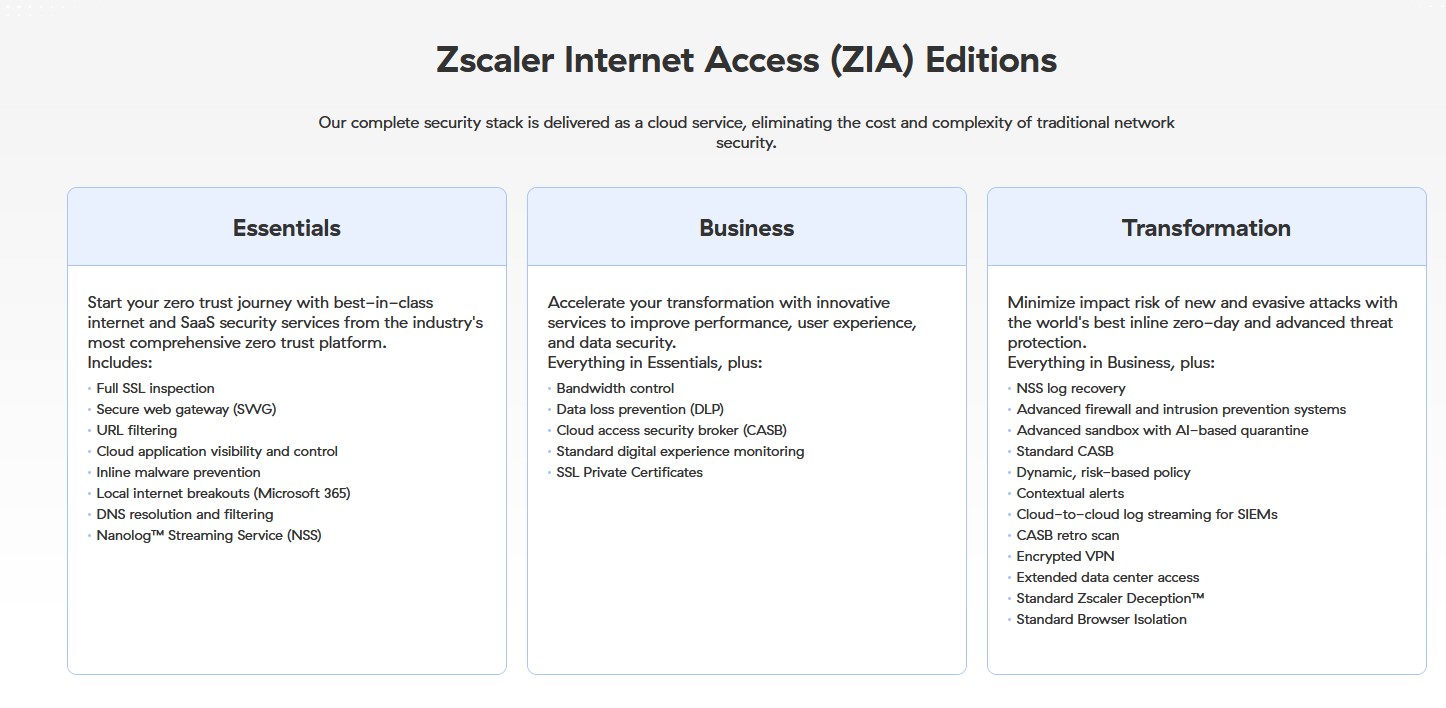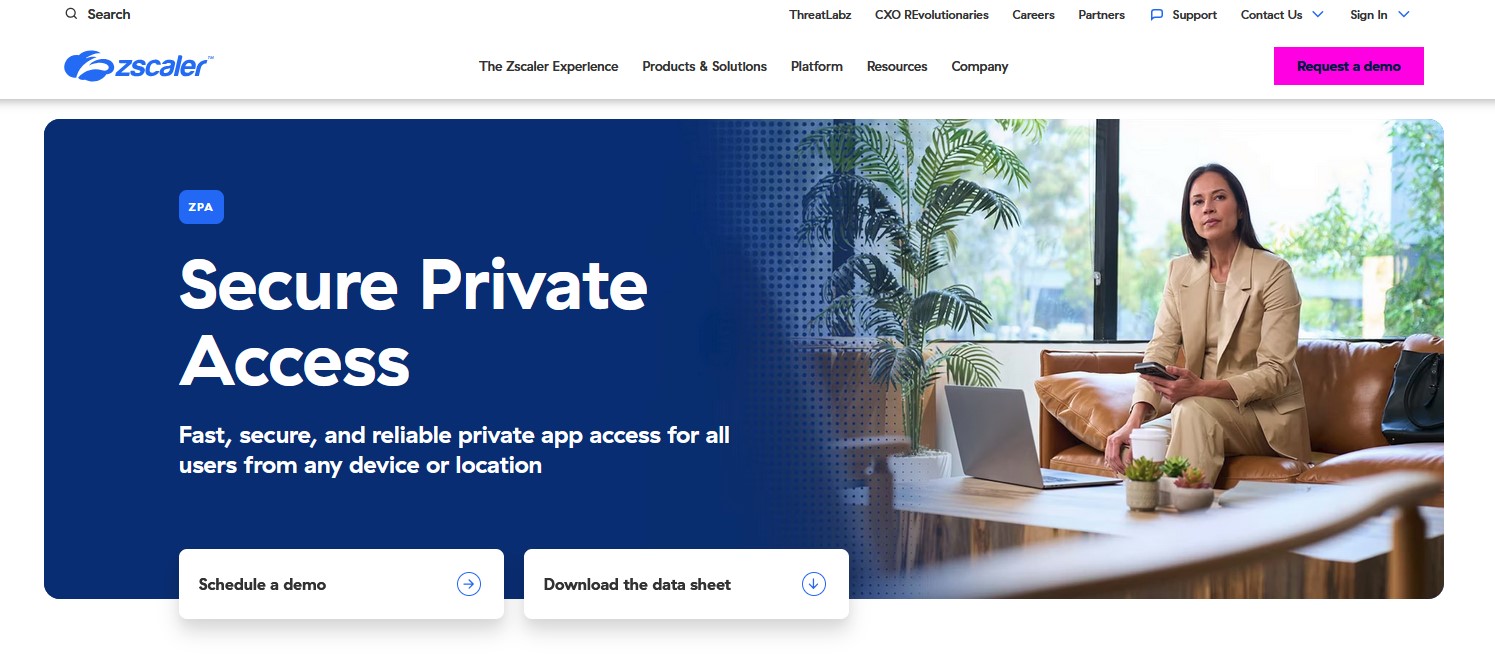TechRadar Verdict
Zscaler’s VPN is part of the broader Zscaler Zero Trust Network Access (ZTNA) platform called Zscaler Private Access (ZPA). It offers a cloud-based security solution tailored for modern businesses. Instead of relying on traditional VPN architectures, Zscaler uses a zero trust model to provide secure access to applications, data, and services, making it ideal for organizations with remote workforces or those looking to protect their cloud-based assets. However, this transition to a cloud-based, zero trust approach might require some adjustment for businesses used to conventional VPN setups.
Pros
- +
Cloud-based solution
- +
Zero trust model
- +
Scalable
- +
Real-time threat protection
Cons
- -
Learning curve for new users
- -
Higher pricing for advanced features
Why you can trust TechRadar
Features
A key advantage of ZPA over traditional VPNs is the seamless, always-on connectivity it offers. In a typical VPN setup, users must log in, establish a connection, and then access corporate resources. This process can be cumbersome, especially for employees who frequently switch networks, such as moving from a wired connection to Wi-Fi or from Wi-Fi to a mobile data network.
With ZPA, there is no concept of "logging in" to a VPN. Once enrolled, users have continuous access to their applications without the need to connect or reconnect manually. This instant access means ZPA provides a smoother, more efficient experience, ensuring that employees can stay productive without constant interruptions.
The user experience is further enhanced when switching networks. While VPN users often need to reconnect every time they switch to a different network, ZPA adjusts automatically, maintaining uninterrupted access to corporate resources. This eliminates the hassle of reconnection prompts and ensures seamless access, making ZPA more convenient for employees who frequently move between networks or work on the go.
ZPA also excels in offering detailed visibility and control over user activity, which traditional VPNs lack. You get real-time insights into user activity, showing which applications are being accessed, how often they are used, and which users consume the most bandwidth. This level of visibility allows administrators to monitor and manage application access more effectively, identify potential security threats, and optimize network performance.
The admin dashboard focuses on user and application management rather than traditional networking elements like ports and protocols. This approach aligns with modern security practices, allowing administrators to manage access based on user roles and application requirements rather than IP addresses or network segments.
Pricing & Plans

Zscaler doesn’t advertise prices on their website, which means you will have to reach out to them directly and get a quote that will revolve around the needs of your business. There are three tiers to choose from, the Essentials which provides the basics of protection offered by the company, which includes the VPN substitute paradigm on which Zscaler’s offering is based. The Business tier relies more on a full ZTNA approach with network segmentation and advanced threat prevention. And finally, the Transformation tier focuses on the full offering of Zscaler, aimed at larger enterprises that have dozens of on and off-site workers, accessing company assets.
While pricing is not directly available, you can get a sense of the costs by looking at the Azure marketplace that advertises the Business plan for $192 for a single user for one whole year. We’re sure you can get a custom quote with better pricing if you reach out directly, though keep in mind that Zscaler is one of the biggest names in the space and that you’re getting a premium package that includes all of the modern bells and whistles tied to a ZTNA approach.
Performance
Zscaler delivers consistently high performance, thanks to its extensive global network of data centers. This widespread network ensures that users experience low latency, even during peak times, as connections are always routed through the nearest and most efficient data center. Since Zscaler operates entirely in the cloud, it offers 99.999% availability, ensuring that your team can securely access resources from anywhere without interruption.
Additionally, Zscaler optimizes traffic through split tunneling, which means only traffic intended for the corporate network is routed through the VPN, while other traffic accesses the internet directly. This approach reduces bandwidth usage and improves overall speed and efficiency. However, if the service goes down, you will be left without internet access for your entire company. Such instances are rare but can happen and should be considered when deciding whether to go with Zscaler or another solution.
Privacy & Security
ZPA employs a ZTNA model, which means that users are only granted access to specific applications they need, rather than the entire network. During the demonstration, the ZPA user couldn't see any other devices or resources on the network, while the VPN user could scan and see various ports and devices connected to the corporate environment. This stark difference illustrates ZPA’s superior security model, as it minimizes the attack surface and reduces the risk of unauthorized access.
By not assigning an IP address to the user’s device on the corporate network, ZPA prevents lateral movement, ensuring that even if one application is compromised, it won’t lead to a wider network breach. This makes ZPA significantly more secure than traditional VPNs, which inherently trust any device connected to the network.
Alternatives
For businesses looking for alternatives, Check Point Quantum is a viable solution that offers both software and hardware solutions for security and safety online. Similar to Zscaler their offering is based on a ZTNA approach and pricing is also premium, especially if you go for the hardware + software combination. Nevertheless, you will be getting the best protection on the market.
ProtonVPN is another viable business VPN alternative to Zscaler. While it may look lightweight in comparison, it certainly is not thanks to its combination of double hop and Secure Core offering you will be able to protect all of your assets easily. It’s much simpler when it comes to setup and deployment and is cheaper in comparison. This doesn’t mean that you won’t have scalability options or top-notch security; so if you’re a smaller or mid-sized business Proton could be a better option.
Final Verdict
If you’re looking for a modern, scalable, and highly secure VPN solution then Zscaler’s ZPA might be the right tool for your organization. Businesses that prioritize security, remote access, and data protection can lean on its zero trust architecture, cloud-based delivery, and real-time threat protection to stay ahead of the threats.
This is one of the things that sets ZPA appart from traditional VPNs. Sure, there is a learning curve if you’re transitioning from standard VPN solutions, but the benefits of enhanced security, performance, and ease of management make Zscaler a worthwhile investment for businesses that rely heavily on remote work or remote access to company resources. As the shift towards cloud-based applications and remote work continues, adopting a zero trust model like ZPA can help businesses stay ahead of potential threats while maintaining efficient and secure access to critical resources.
- We've listed the best business VPNs and the best VPNs with antivirus
Sead is a seasoned freelance journalist based in Sarajevo, Bosnia and Herzegovina. He writes about IT (cloud, IoT, 5G, VPN) and cybersecurity (ransomware, data breaches, laws and regulations). In his career, spanning more than a decade, he’s written for numerous media outlets, including Al Jazeera Balkans. He’s also held several modules on content writing for Represent Communications.
